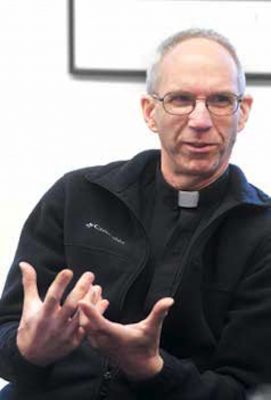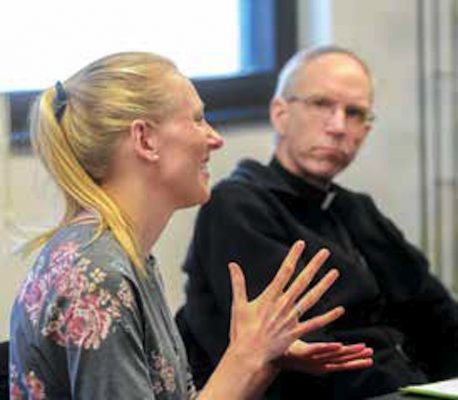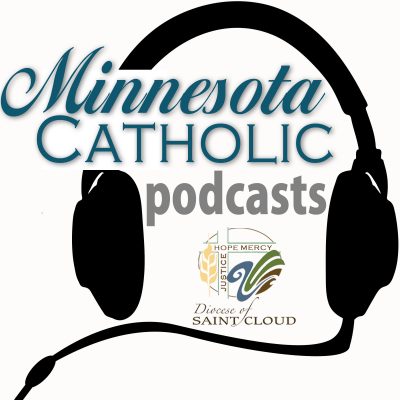A new idea surfaced recently — thanks to The Central Minnesota Catholic magazine readers — to feature a “big question” facing the Church today. In 2020, the magazine will tackle a current topic each month by inviting people to weigh in on the issue. The subject might not be new, but we hope to bring a fresh perspective and revitalizing dialogue to our Catholic communities.
At the end of each article, readers will find reflection questions to ponder individually or discuss with a group. In conjunction with the conversations printed in the magazine, podcasts with additional insights will be available through the website. Readers also will have an opportunity to respond to the editor with what they’ve learned. Some comments may be chosen to be printed in a future issue of the magazine.
The first big question is, “What does it really mean to be pro-life?” Contributing to the conversation are: Kateri Mancini, director of social concerns for Catholic Charities of the Diocese of St. Cloud; Nikki Silbernick, director of faith formation at St. Mary’s Cathedral and St. Augustine parishes in St. Cloud; and Father Tom Knoblach, consultant for health care ethics for the Diocese of St. Cloud and pastor of the parishes of Holy Spirit, St. Anthony and St. John Cantius in St. Cloud.
Q: When you hear the term “pro-life,” what does that word mean to you?

KATERI: To me, it means being “for” life. The “pro” stands for “protect,” meaning to protect life, and ultimately upholding the life of others in whatever way that may mean for their circumstances, their environments, whatever their life is, with its challenges and blessings.
NIKKI: What immediately comes to mind is recognizing the inherent God-given dignity of every person. We talk about life from conception to natural death. I think that speaks to so much of what pro-life means, really upholding the dignity of every human person at every stage of their life, and just recognizing that every person is made in God’s image and that every person deserves to be treated as a child of God.
FATHER TOM: It’s hard to add to that. I often speak actually of respect for life, just because “pro-life” has become such a political hot potato. So, hopefully it helps people sort of back away from their particular political stance on that issue and look at: Why are we pro-life? Because we have respect for life. And, as you say, it is [about] dignity. To me, that is the most challenging teaching of Jesus. Whatever you do to the least, you do to me. That is a constant challenge.
Q: How does your ministry support pro-life values?
KATERI: All of our work at social concerns is around respect for life, around that dignity of each person. And what Nikki was saying about all the stages of life, that’s where I find such excitement and beauty in my work. So many Catholics are really great at upholding the beginning and the end-of-life values. Sometimes we lose sight of all those different stages and circumstances in between that can be life-threatening. Living in poverty is a life issue because it’s life-threatening — hunger, homelessness, racism and oppression. Our bishops have told us that poverty is a life issue, unequivocally.

NIKKI: [One] part of my work is youth ministry. I wasn’t quite expecting this to be pro-life work but [it involves] helping teens to see their dignity, especially ones that are going through anxiety, depression, suicidal thoughts, all of those things, to really see their goodness and their inherent value. It’s not in what they can do. It’s not in how athletic they are, how smart they are, any of those external things. But just inherently how good they are, and the mission that God has for them and the purpose of why he created them.
FATHER TOM: Something beautiful about parish life is you’ve got this whole spectrum. You baptize babies and you bury the elderly — and there’s everything in between. … That’s a part of parish life — to acknowledge all those different circumstances that represent the cross in the pilgrimage of faith, and how we persevere in faith, and how we reach out to support those who are going through difficult times. Faith naturally draws us out of ourselves if it is authentic faith. I remember a quote from Pope Benedict where he said: If you recognize Jesus in the Blessed Sacrament, then you also recognize him in your brothers and sisters. It’s the body of Christ. And sometimes I’m slow on the uptake, but every once in a while I get that sense when people come to Communion and [I] say, “The body of Christ.” Well, that is the body of Christ who’s coming to receive the body of Christ. And that helps me to kind of keep that broader focus.
Q: Pro-life is kind of a hot button word in the political arena. Why do you think there’s so much controversy around this word, and how would you encourage people to think about what it means to be pro-life in light of the Church’s teachings?

FATHER TOM: Opposing abortion on demand became sort of synonymous for many people with pro-life or respect life. And I often say, ironically, the destruction of early life has a lot of “children” — euthanasia, abuse, violence, school violence, the opioid crisis — all of these … are largely colored by this lack of respect for the essential basic gift of life. …
Respect for life is a whole, and not everybody has to do all of it. That’s what it means to be a church, the Catholic Church. That someone is ministering to all of those different aspects, and that’s my work as well because I belong to this body and so we support it with prayer. We support it with financial contributions [and] volunteer work. We don’t have to compete with one another. We just say, I can’t do it all. We support rather than divide.
KATERI: I continue to try to educate folks in our diocese on the [U.S.] bishops’ document on “faithful citizenship.” Every time we have an election or a hot button issue, people in conversation will say, “We have to be this party as Catholics because of this particular issue or the other.” To Father Tom’s point, everyone has an issue, or I hope they have an issue, that they’re passionate about. As the whole body of Christ, that can be a lot of different issues and a lot of passion out there trying to make a difference in our world. And our bishops continue to tell us, and the Gospel continues to tell us, that no political party encompasses all of the life issues, all of our Catholic values.
We’re called to examine our conscience. We’re called to be educated and formed when it comes to every political decision we’re making and every candidate or party we’re looking at. Unfortunately, we’ve gotten so divided. We’ve become kind of a culture of boxes. … When we stay stuck in those boxes, we forget to realize the wide spectrum of issues, the wide spectrum of opinions that can co-exist together and that our faith calls us to dialogue about. … Because pro-life issues span this whole life spectrum and so many different situations, it’s hard to have one party that’s going to meet exactly what we’re praying for and hoping for.
NIKKI: Just because we can’t do everything doesn’t mean we can’t do something. And I think that’s a really essential truth that we need to regain. Yes, as an individual, I can’t change the world in every single one of these ways, but we’re all called to be a part of [the change]. A big danger that I see is demonizing those who don’t agree with us.
One time I was at a 40 Days for Life event, praying in front of Planned Parenthood. There was a couple that walked by and got into a heated argument with one of the people standing there holding a sign.
I was just a bystander but eventually felt called to intervene, since the pro-lifers were clearly not listening but rather kept shouting ‘Abortion is wrong!’ I started talking to the couple and asking more about what they believe and where they stand on these things. And they said, “We don’t even support abortion. We just believe that contraception is important.” And so we were able to launch this beautiful discussion about what we believe as Catholics on contraception and giving all of yourself to your spouse, including your fertility. It was an eyeopening experience, being able to step back and really listen to what they were saying and then figuring out the heart of the issue. It’s so important to be strong in what we believe, but we have to speak the truth with love.
Q: The pro-life debate is often associated closely with pregnancy and contraception. Should we be thinking about pro-life when discussing other issues like, physician-assisted suicide and capital punishment, poverty and immigration?

NIKKI: All of those things play into pro-life. But I think it’s also really important not to lose sight of the reality and prevalence of abortion. Sometimes people can either go to one extreme or the other. It’s like, “Abortion is the only issue we need to be focusing on.” And then there’s the opposite, “Well, abortion is just one of many things.”
I think it’s important to keep in mind the staggering numbers of what’s really happening. I’ve become more passionate about this since becoming pregnant and just being able to feel the baby move, and to see ultrasounds as early as seven weeks and its development — I’m following my app every day. You know what’s really happening with the baby, and so it’s just incredible, the beauty of life.
I’ve become even more passionate about how important life really is and how [abortion] really is a hidden holocaust in our society. I feel it needs more attention and not in the negative ways that this issue has been receiving attention in popular media. In the Church, there’s a much more positive connotation to it, but even there, it can be very divisive. My hope is to reclaim what it means to have a healthy view of what is important in the abortion argument while also seeing the value of all the other pro-life issues.
FATHER TOM: I go back to, “Whatever you do to the least, you do to Me.” All of us have some picture of what the “least” is and it’s not just one category. The person who I don’t care about for whatever reason is the least, among the least, for me. I personally believe that there is a primacy to the abortion issue because of that vulnerability, that extreme vulnerability — here’s an individual that has no resources on his or her own. St. John Paul II said it so beautifully: “You see the strength of the society by how it treats the most vulnerable and powerless.”
KATERI: As a woman who has four children in my home and four in heaven, I know very well how real life is from so early on. There is no doubt in my mind, in my heart, in my faith, that it’s a human life from before the very start. But then I look at the children that I am raising in my home, and I think of the things they have to go through — a son who likely has anxiety and will continue dealing with that, children who could end up having special needs, developmental disabilities.
[perfectpullquote align=”full” bordertop=”false” cite=”” link=”” color=”” class=”” size=””]“To me, it means being ‘for’ life.” — Kateri Mancini
[/perfectpullquote]They’re still a life, a vulnerable life, who I as a mother, am blessed to be able to care for and walk with and advocate for and fight for. Every person is some mother’s child. They are our Holy Mary mother’s child, and I believe we are, through all of those stages of their life, called to protect them, to advocate for them, to walk with them, to provide for them.
So, yes, there is a primacy in the anti-abortion issue and I’m there 100% from my own experience as well as what I believe our faith calls us to. I think it has to continue on with such primacy for others, as they’re growing, too. Just knowing that, if there is any person out there in this world who loves that individual, as stand up for them. Because I know that our God loves them three billion times more than I love them — more than even that one other person on earth loves them. So I believe we’re called to stand up for them.
Q: Nikki, as you in your ministry are forming multi-generations of people in the faith, where do you draw inspiration from to help them understand the value of life?
NIKKI: The first thing that comes to mind for me is our confirmation classes. We’ve talked a lot about Theology of the Body because it’s one thing that I’m really passionate about: understanding the beauty of human sexuality and who we are as created in God’s image. And then how that plays into everything else … understanding that we’re made to be a gift to others. I love telling confirmation students that God’s plan is so much more beautiful than ours, and he calls us to so much more. Anything that the Church says no to is because it’s not good enough for us.
Q: Kateri, when you address social concerns in the diocese, what helps shape your decisions, especially regarding life and dignity?
KATERI: Matthew 25 is a big inspiration. When you feed another, when you clothe another, when you visit another in prison, when you welcome a stranger, when you care for your neighbors, that’s what you’re doing for [Christ]. That’s when you’re living out the Gospel call. Catholic social teachings [encompasses] seven principles. Our Church has a long, rich history of Scripture and tradition and boiled it all down into seven themes. … looking at those and applying those to different situations: How does the option for the poor and vulnerable play out here? How does the common good play out here? How does solidarity and walking with someone else in their situation play out with this particular need?
FATHER TOM: You both touched on something that often strikes me — where do people hear these positive messages if they don’t hear them anywhere else? If the Church doesn’t say them or live them, who else is going to tell them?
With all the things that we’ve talked about here, to emphasize as you’ve said, you can be passionate about a part of this, but recognize that, as Mother Teresa often said, “None of us can do everything, but all of us can do something. And so, what will you do?” It’s easy. You list some of those issues that face young people and families across the spectrum of life and it’s overwhelming. [It can feel like] you can’t do any of this, it’s insoluble. And so, we’re tempted to just sort of stand on the sidelines.
I think the saints show us across history people who said, “I can’t do everything, but here’s something I can do.”
////////////////
Minnesota Catholic Podcasts — JANUARY 2020
You can access the following podcasts for January by visiting www.TheCentralMinnesotaCatholic.org and clicking on “Minnesota Catholic Podcasts.” You also can subscribe to Minnesota Catholic Podcasts on iTunes or Google Play.
Topic: Physician-assisted suicide
Guest: Father Tom Knoblach, consultant for health care ethics for the Diocese of St. Cloud
Father Knoblach talks about Catholic teaching regarding end-of-life care and how Catholics can best respond if efforts to legalize physician-assisted suicide surface during this year’s state legislative session.
Topic: 40 Days for Life campaign
Guest: Judy Haag, leader of 40 Days for Life in the St. Cloud area
Haag discusses the origin and mission of the 40 Days for Life campaign, the impact it is having and how people can get involved.
Topic: Hands Across the World
Guest: Brianda Cediel, co-founder and executive director of Hands Across the World
Cediel talks about the organization’s efforts to promote human dignity by assisting newly-arrived immigrants and refugees to obtain the skills they need to flourish in their new homes.
Question for reflection
After reading the roundtable discussion about what it means to be pro-life, consider what it means to you. What is one action you can take to be a strong pro-life witness?
You are invited to submit your answer to editor Joe Towalski at jtowalski@gw.stcdio. org. A sampling of answers will be published in a future edition of The Central Minnesota Catholic.






















